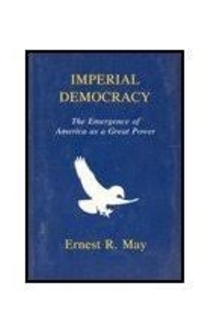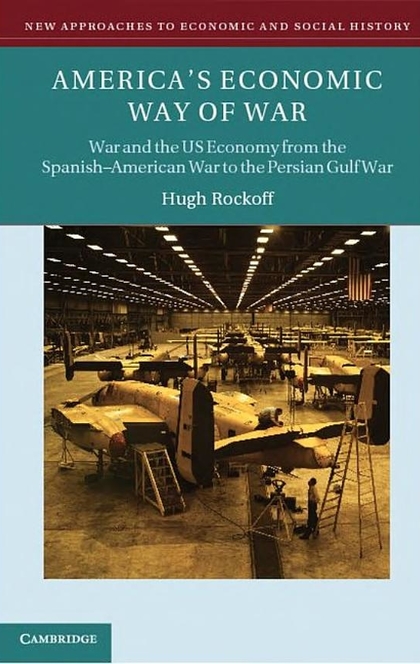
21 Best Books About America from 19th Century from Dan Carlin
Dan Carlin
21 Books recommended by Dan Carlin about the U.S. history in 19th and 20th centuries and its expanding national interests. Dan Carlin is #1 history expert, so make sure to check this immense list of his book recommendations!
See all
0
likes
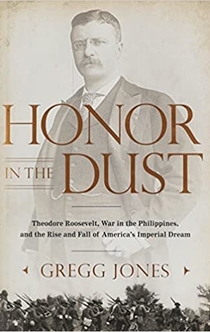
Honor in the Dust
“Fascinating.”—New York Times Book Review • “Well-written.”—The Boston Globe • “Extraordinary.”—The Christian Science Monitor • “A compelling page-turner.”—Adam HochschildOn the eve of a new century, an up-and-coming Theodore Roosevelt set out to transform the U.S. into a major world power. The Spanish-American War would forever change America's standing in global affairs, and drive the young nation into its own imperial showdown in the Philippines.From Admiral George Dewey's legendary naval victory in Manila Bay to the Rough Riders' heroic charge up San Juan Hill, from Roosevelt's rise to the presidency to charges of U.S. military misconduct in the Philippines, Honor in the Dust brilliantly captures an era brimming with American optimism and confidence as the nation expanded its influence abroad.
See all
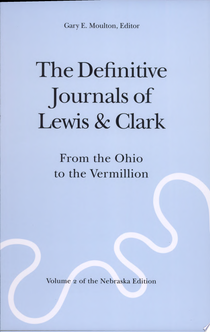
The War with Spain in 1898
"The book's virtues are many: the author's often persuasive judgments, the scrupulous care with which he treats sources, the illuminating integration of American, Spanish, Cuban, and Filipino perspectives. . . . This is, in sum, a work that will long remain the major reference volume on the war of 1898".-American Historical Review. "[Trask] examines many of the political and geographical ramifications so often overlooked in popular histories. This is all deftly presented and the battle scenes are exciting".-Library Journal. "Remember the Maine!" The war cry spread throughout the United States after the American battleship was blown up in Havana harbor on February 15, 1898. Americans, already sympathetic with Cuba's struggle for independence from Spain, demanded action. Brief and decisive, not too costly, the Spanish-American War made the United States a world power. David F. Trask's War with Spain in 1898 is a cogent political and military history of that "splendid little war". It describes the failure of diplomacy; the state of preparedness of both sides; the battles, including those of Theodore Roosevelt and his Rough Riders; the enlargement of conflict to rout the Spanish from Puerto Rico and the Philippines; and the misconceptions surrounding the war. Chief historian at the U.S. Army Center for Military History, David F. Trask is also the author of The AEF and Coalition Warmaking, 1917-1918.
See all
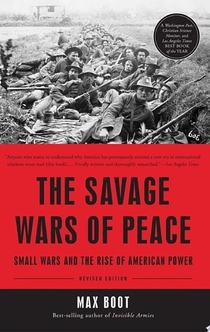
The Savage Wars Of Peace
"Anyone who wants to understand why America has permanently entered a new era in international relations must read [this book].... Vividly written and thoroughly researched." --Los Angeles TimesAmerica's "small wars," "imperial war," or, as the Pentagon now terms them, "low-intensity conflicts," have played an essential but little-appreciated role in its growth as a world power. Beginning with Jefferson's expedition against the Barbary pirates, Max Boot tells the exciting stories of our sometimes minor but often bloody landings in Samoa, the Philippines, China, Haiti, the Dominican Republic, Nicaragua, Mexico, Russia, and elsewhere. Along the way he sketches colorful portraits of little-known military heroes such as Stephen Decatur, "Fighting Fred" Funston, and Smedly Butler.This revised and updated edition of Boot's compellingly readable history of the forgotten wars that helped promote America's rise in the lst two centuries includes a wealth of new material, including a chapter on the wars in Iraq and Afghanistan, and a new afterword on the lessons of the post-9/11 world.
See all

What America Owes the World
For two hundred years, Americans have believed that they have an obligation to improve the lot of humanity, a belief which has consistently shaped U.S. foreign policy. Yet within this consensus, there are two competing schools of thought: the "exemplarist" school (Brands' term) which holds that what America chiefly owes the world is the benign example of a well-functioning democracy, and the "vindicationist" school which argues that force must sometimes supplement a good example. In this book, H.W. Brands traces the evolution of these two schools as they emerged in the thinking and writing of the most important public thinkers of the last two centuries.
See all

The Spanish War
On the night of February 15, 1898, the U.S. battleship Maine was ripped in half by an explosion in Havana harbor with the loss of 266 American lives. War with Spain followed nine weeks later. After a three-month fight on two fronts half a world apart, the era of isolation was gone forever, as the United States formed alliances and gained spheres of influence that would shape its desstiny for decades to come.G. J. A. O'Toole colorfully depicts the sweep of events and also presents new findings on the mysterious mission of the Maine and on the part played by Washington in the expansion of the conflict.
See all

The War of 1898
A century after the Cuban war for independence was fought, Louis Perez examines the meaning of the war of 1898 as represented in one hundred years of American historical writing. Offering both a critique of the conventional historiography and an alternate history of the war informed by Cuban sources, Perez explores the assumptions that have shaped our understanding of the "Spanish-American War--a construct, he argues, that denies the Cubans' participation in their own struggle for liberation from Spanish rule. Perez examines historical accounts of the destruction of the battleship Maine, the representation of public opinion as a precipitant of war, and the treatment of the military campaign in Cuba. Equally important, he shows how historical narratives have helped sustain notions of America's national purpose and policy, many of which were first articulated in 1898. Cuba insinuated itself into one of the most important chapters of U.S. history, and what happened on the island in the final decade of the nineteenth century--and the way in which what happened was subsequently represented--has had far-reaching implications, many of which continue to resonate today.
See all

"Benevolent Assimilation"
American acquisition of the Philippines and Filipino resistance to it became a focal point for debate on American imperialism. In a lively narrative, Miller tells the story of the war and how it challenged America’s sense of innocence. He examines the roles of key actors—the generals and presidents, the soldiers and senators—in America’s colonial adventure.“The most thorough, balanced, and well-written study to date of America’s imperial adventure in the western Pacific and the most persuasive analysis of the varied reactions of the American people to the military subjugation of the Filipinos. . . . [Told] with clarity, wit and a talent for the apt "ation.”—Richard E. Welch, Jr., The New York Times Book Review“A triumph of research, synthesis and storytelling, this is the wisest book on its subject and, implicitly, a significant cultural critique of the United States at the turn of the century.”—Peter Stanley, Asia“The author’s balanced summary of the historiography of imperialism and the epilogue, which considers the Philippine/Vietnam analogy, are valuable features of the work. . . . Should remain the definitive account of these events.”—Library Journal“Written with clarity and argued with passion from a wealth of primary sources.”—Jack C. Lane, The Journal of American History.
See all
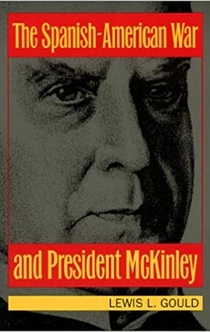
The Spanish-American War and President McKinley
This lively, thought-provoking analysis is based on the author's highly acclaimed Presidency of William McKinley. "This is by all odds the best study of the coming of the war, the war itself, and the aftermath of the conflict."—Paul S. Holbo, University of Oregon. "According to the author, McKinley's enhancement of presidential power and his personal leadership in war-making and diplomacy made him 'the first truly modern president.' This thesis is carefully developed and effectively argued. . . . The book's brevity, readability, and interpretive insights make it attractive for the classroom. . . . But this is no mere digest for undergraduates, for more advanced scholars can learn from it, too."—Pacific Historical Review.
See all

Empire for Liberty
How could the United States, a nation founded on the principles of liberty and equality, have produced Abu Ghraib, torture memos, Plamegate, and warrantless wiretaps? Did America set out to become an empire? And if so, how has it reconciled its imperialism--and in some cases, its crimes--with the idea of liberty so forcefully expressed in the Declaration of Independence? Empire for Liberty tells the story of men who used the rhetoric of liberty to further their imperial ambitions, and reveals that the quest for empire has guided the nation's architects from the very beginning--and continues to do so today. Historian Richard Immerman paints nuanced portraits of six exceptional public figures who manifestly influenced the course of American empire: Benjamin Franklin, John Quincy Adams, William Henry Seward, Henry Cabot Lodge, John Foster Dulles, and Paul Wolfowitz. Each played a pivotal role as empire builder and, with the exception of Adams, did so without occupying the presidency. Taking readers from the founding of the republic to the Global War on Terror, Immerman shows how each individual's influence arose from a keen sensitivity to the concerns of his times; how the trajectory of American empire was relentless if not straight; and how these shrewd and powerful individuals shaped their rhetoric about liberty to suit their needs. But as Immerman demonstrates in this timely and provocative book, liberty and empire were on a collision course. And in the Global War on Terror and the occupation of Iraq, they violently collided.
See all

Mark Twain and the Colonel
Mark Twain and the Colonel tells the story of America between 1890 and 1910 through the fully engaged involvement of the era's two most vital participants: Mark Twain and Theodore Roosevelt. At this pivotal moment in our history, the previously frontier-driven expansion of America was being replaced by an America that had begun to legitimately think of itself as a world power, and a dominant presence and leader on the international stage. No longer merely a successful experiment in democracy and republicanism, America saw tensions arise between those focused on which areas of American life necessitated radical progress, and which required devout preservation. Tensions like these manifested nowhere more tellingly than between our greatest humorist and our youngest President, whose warring visions of what America could and ought to be were radically different, but nevertheless laid the bedrock for modern America - its arguments, achievements, and aspirations - as we came to see it through the twentieth century, and to the present day.
See all

An Autobiography of Theodore Roosevelt
Based in part on his own writings, this is the true story about one of America’s most beloved leaders. From president of the board of New York City Police Commissioners, secretary of the Navy, founder of the Rough Riders during the war with Cuba, his time as the governor of New York, to vice president and eventually, after the assignation of President McKinley, becoming the twenty-sixth president of the United States, Theodore Roosevelt’s role in the shaping of the United States is still felt today. Illustrated with drawing and photos, discover the rich history of this great man’s life here.
See all

An Unwanted War
Offner clarifies the complex relations of the United States, Spain, and Cuba leading up to the Spanish-American War and contends that the war was not wanted by any of the parties but was nonetheless unavoidable. He shows that a final round of peace negotiations failed in large part because internal political constraints limited diplomatic flexibility.
See all
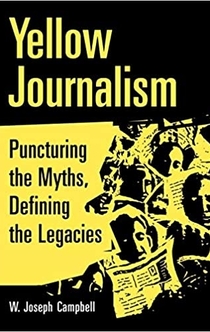
Yellow Journalism
The yellow press period in American journalism history has produced many powerful and enduring myths-almost none of them true. This study explores these legends, presenting extensive evidence that: -The yellow press did not foment-could not have fomented-the Spanish-American War in 1898, contrary of the arguments of many media historians. -The famous exchange of telegrams between the artist Frederic Remington and newspaper publisher William Randolph Hearst-in which Hearst is said to have vowed to furnish the war with Spain-almost certainly never took place. -The readership of the yellow press was not confined to immigrants and people having an uncertain command of English, as many media historians maintain. rather yellow journals were most likely read across the social strata of urban America. -The term yellow journalism emerged and took hold during a period of raging competition and intolerance among newspaper editors in New York City-and did not directly result from the rivalry between Hearst and Joseph Pulitzer, as most media historians claim.The study also presents the results of a detailed content analysis of seven leading U. S. newspapers at 10 year intervals, from 1899 to 1999. The content analysis-which included the Denver Post, Los Angeles Times, New York Times, Raleigh News and Observer, St. Louis Post-Dispatch, San Francisco Examiner and Washington Post-reveal that some elements characteristic of yellow journalism have been generally adopted by leading U. S. newspapers. This critical assessment encourages a more precise understanding of the history of yellow journalism, appealing to scholars of American journalism, journalism history, and practicing journalists.
See all
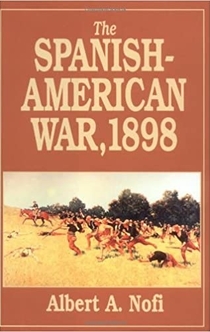
Spanish American War, 1898
The Spanish American War of 1898 is often viewed as a disjointed series of colorful episodes; young Americans who would later become famous, fighting a Spanish colonial army putting up a token resistance. Military commentator and historian Albert A. Nofi presents the war as a coherent military narrative, showing the confluence of the American command's Civil War experience and recent developments in technology. Serious attention is also given to the Spanish forces, the army of an empire in decline, but well-equipped and tactically sophisticated.Detailed coverage is given of both American and Spanish aims, assumptions and strategy. The author's colorful narrative is supplemented by 50 illustrations, most of which have not appeared in print since the era of the war.Specially commissioned maps highlight the most tactically significant land and naval engagements, such as the Spanish defense of El Caney and the Spanish fleet's dramatic but futile attempt to break out of Santiago harbor.Military operations are placed in the context of a growing American nation in a wider world, 35 years after the Civil War. The Spanish American War features a detailed treatment of the war in Puerto Rico. This theater was under the command of Indian fighter Nelson A. Miles and included some of the best tactical maneuvering of the war. The Puerto Rican aspect has not been covered in detail in modern works.Albert Nofi has made use of works covering the Spanish that have not been widely used in English-language works, as well as American eyewitness accounts that have not been examined in nearly a century.
See all
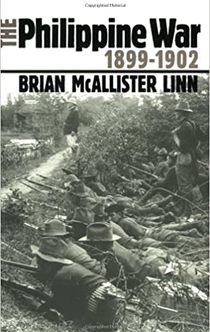
The Philippine War, 1899-1902
Focusing purely on the military aspects of the war, Linn (history, Texas A&M U.) argues that previous studies of the war have mischaracterized it as having qualities which can only be ascribed to the final few campaigns (i.e. concentration camps, American brutality and torture, and one officer's threat to turn the Philippines into a "howling wilderness"). Reviewing the fighting in every Filipino province, he finds that the American victory was due more to rebel mistakes and American "social reform" than to overwhelming American military force.
See all

1898
In 1898: The Birth of the American Century, David Traxel tells the story of a watershed year, a year of foreign conflict, extravagant adventure, and breakneck social change that forged a new America—a sudden empire with many far-flung possessions, a dynamic new player upon the global stage.At the heart of this vivid, anecdotal history is a masterly account of the Spanish-American War, the "splendid little war" that garnered the nation Guam, Puerto Rico, and the Philippines. From the sinking of the Maine in waters off Havana to Teddy Roosevelt's rough riders and the triumph of Admiral Dewey, here is the lightning-swift military episode that transformed America into a world power. Here too are many stories not so often told—the bloody first successes of the new United Mine Workers, the tentative beginnings of the Ford Motor Company, the million-dollar launch of the Uneeda Biscuit—each in its way as important as the harbinger of the American century. Compulsively readable, frequently humorous, utterly fascinating in its every detail, 1898 is popular history at its finest.
See all

The War Lovers
On February 15, 1898, the American ship USS Maine mysteriously exploded in the Havana Harbor. News of the blast quickly reached U.S. shores, where it was met by some not with alarm but great enthusiasm. A powerful group of war lovers agitated that the United States exert its muscle across the seas. Theodore Roosevelt and Henry Cabot Lodge were influential politicians dismayed by the "closing" of the Western frontier. William Randolph Hearst's New York Journal falsely heralded that Spain's "secret infernal machine" had destroyed the battleship as Hearst himself saw great potential in whipping Americans into a frenzy. The Maine would provide the excuse they'd been waiting for. On the other side were Roosevelt's former teacher, philosopher William James, and his friend and political ally, Thomas Reed, the powerful Speaker of the House. Both foresaw a disaster. At stake was not only sending troops to Cuba and the Philippines, Spain's sprawling colony on the other side of the world-but the friendships between these men. Now, bestselling historian Evan Thomas brings us the full story of this monumental turning point in American history. Epic in scope and revelatory in detail, The War Lovers takes us from Boston mansions to the halls of Congress to the beaches of Cuba and the jungles of the Philippines. It is landmark work with an unforgettable cast of characters-and provocative relevance to today.
See all

Theodore Rex
Theodore Rex is the story—never fully told before—of Theodore Roosevelt’s two world-changing terms as President of the United States. A hundred years before the catastrophe of September 11, 2001, “TR” succeeded to power in the aftermath of an act of terrorism. Youngest of all our chief executives, he rallied a stricken nation with his superhuman energy, charm, and political skills. He proceeded to combat the problems of race and labor relations and trust control while making the Panama Canal possible and winning the Nobel Peace Prize. But his most historic achievement remains his creation of a national conservation policy, and his monument millions of acres of protected parks and forest. Theodore Rex ends with TR leaving office, still only fifty years old, his future reputation secure as one of our greatest presidents.
See all

The Blood of Government
In 1899 the United States, having announced its arrival as a world power during the Spanish-Cuban-American War, inaugurated a brutal war of imperial conquest against the Philippine Republic. Over the next five decades, U.S. imperialists justified their colonial empire by crafting novel racial ideologies adapted to new realities of collaboration and anticolonial resistance. In this path breaking, transnational study, Paul A. Kramer reveals how racial politics served U.S. empire, and how empire-building in turn transformed ideas of race and nation in both the United States and the Philippines. Kramer argues that Philippine-American colonial history was characterized by struggles over sovereignty and recognition. In the wake of a racial-exterminist war, U.S. colonialists, in dialogue with Filipino elites, divided the Philippine population into ''civilized'' Christians and ''savage'' animists and Muslims. The former were subjected to a calibrated colonialism that gradually extended them self-government as they demonstrated their ''capacities.'' The latter were governed first by Americans, then by Christian Filipinos who had proven themselves worthy of shouldering the ''white man's burden.'' Ultimately, however, this racial vision of imperial nation-building collided with U.S. nativist efforts to insulate the United States from its colonies, even at the cost of Philippine independence. Kramer provides an innovative account of the global transformations of race and the centrality of empire to twentieth-century U.S. and Philippine histories.
See all

America's Economic Way of War
How did economic and financial factors determine how America waged war in the twentieth century? This important new book exposes the influence of economics and finance on the questions of whether the nation should go to war, how wars would be fought, how resources would be mobilized, and the long-term consequences for the American economy. Ranging from the Spanish-American War to the Gulf War, Hugh Rockoff explores the ways in which war can provide unique opportunities for understanding the basic principles of economics as wars produce immense changes in monetary and fiscal policy and so provide a wealth of information about how these policies actually work. He shows that wars have been more costly to the United States than most Americans realize as a substantial reliance on borrowing from the public, money creation and other strategies to finance America's war efforts have hidden the true cost of war.
See all

